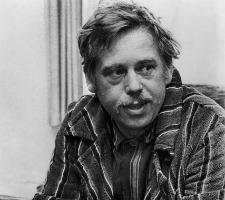BROOKE GLADSTONE:
Last Sunday the man who was the last President of Czechoslovakia before it split in two and then President of the Czech Republic, possibly the last protesting, playwriting, essay-penning, poetizing president of anywhere, died.
Vaclav Havel seemed a reluctant politician, but he was primed for the role, immersed as he was in the Theatre of the Absurd. His taste tended toward the dark and subversive, hence his friendships with Frank Zappa and Lou Reed. But his politics were sunlit and sincere.
"A good politician," he wrote, "should humbly look for the truth of this world without claiming to be its professional owner, and he should alert people to the good qualities in themselves, including a sense of the values and interests that transcend the personal, without taking on an air of superiority and imposing anything on his fellow humans."
It was the Communist government's insistence on conformity that led Havel to become a founding member of Charter 77, a dangerous assertion of the right to spread ideas and to disagree with the powers that be.
[SINGING/PLASTIC PEOPLE OF THE UNIVERSE]
It was sparked by the jailing of the Prague rock group Plastic People of the Universe, a band that dared to be indifferent to the government's dictates.
In one of his best-known essays, The Power of the Powerless, Havel writes of the grocer who places in his window a sign, delivered like his produce, with the slogan, "Workers of the World Unite." Most likely he's oblivious to the message but that doesn't mean it conveys no meaning. "The sign means," writes Havel," that I, the greengrocer XY, live here and I know what I must do. I am obedient and therefore I have the right to be left in peace."
"But" Havel continues, "Let us now imagine that one day something in our greengrocer snaps and he stops putting up the slogans. He stops voting in elections he knows are a farce. He begins to say what he really thinks at political meetings. And he even finds the strength in himself to express solidarity with those whom his conscience commands him to support.
In this revolt the greengrocer steps out of living within the lie. He discovers once more his suppressed identity and dignity. He gives his freedom concrete significance. His revolt is an attempt to live within the truth…."
To live within the truth. How do you do that? How do you know? Maybe you have to be an absurdist, idealist rock 'n roller to believe you can do it. If Vaclav Havel did it, so - you know it can be done.
